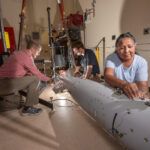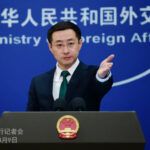Watch now—The UK’s new nuclear posture: What it means for the global nuclear order
By Halley Posner | May 28, 2021
Watch the Bulletin virtual program, “The UK’s new nuclear posture: What it means for the global nuclear order” featuring Hans Kristensen and Heather Williams in conversation with Julian Borger.
In this conversation, you will hear about how the United Kingdom’s decision to increase their nuclear stockpile limit fits into global trends towards nuclear modernization but also what can be done to keep on the path of disarmament.
Read more Bulletin coverage of nuclear risk and listen to all of our virtual programs.
Hans Kristensen is the director of the Nuclear Information Project with the Federation of American Scientists (FAS) in Washington, DC. His work focuses on researching and writing about the status of nuclear weapons and the policies that direct them. Kristensen is a co-author to the world nuclear forces overview in the SIPRI Yearbook (Oxford University Press) and a frequent adviser to the news media on nuclear weapons policy and operations. He has co-authored the Nuclear Notebook since 2001.
Heather Williams is a Stanton Nuclear Security Fellow at the Massachusetts Institute of Technology (MIT), Security Studies Program (SSP). She is visiting from King’s College London, where she is a Lecturer in the Defence Studies Department. From 2018 to 2019 Heather served as a Specialist Advisor to the House of Lords inquiry into the Nuclear Non-Proliferation Treaty and Disarmament, and until 2015 she was a Research Fellow at Chatham House. She is a member of the Wilton Park Advisory Council, an Associate Fellow at the Royal United Services Institute (RUSI), and a Senior Associate Fellow with the European Leadership Network. Her recent publications include, “U.K. Nuclear Weapons: Beyond the Numbers” in War on the Rocks (April 2021); “The Unavoidable Technology: How Artificial Intelligence can Strengthen Strategic Stability” in The Washington Quarterly (with Jessica Cox, March 2021), and “What the Nuclear Ban Treaty Means for America’s Allies” in War on the Rocks (November 2020).
Julian Borger is the Guardian’s world affairs editor, based in Washington. He covers nuclear proliferation and disarmament issues and reported on the Iran nuclear negotiations, the 2015 JCPOA agreement and its aftermath. He covered the Bosnian war for the BBC and The Guardian, and returned to the Balkans to report on the Kosovo conflict in 1999. He has also served as the Guardian’s Middle East correspondent and its Washington Bureau Chief. Borger was part of the Guardian team that won the 2014 Pulitzer Prize for public service journalism, for its coverage of the Snowden files on mass surveillance. He was also in the team awarded the 2013 Investigative Reporters and Editors (IRE) medal and the Paul Foot Special Investigation Award in the UK. He won the One World Media Press Award in 2016 for a feature story on the investigation of war crimes in Syria. His book, The Butcher’s Trail: How the Search for Balkan War Criminals Became the World’s Most Successful Manhunt, was published in 2016.
Together, we make the world safer.
The Bulletin elevates expert voices above the noise. But as an independent nonprofit organization, our operations depend on the support of readers like you. Help us continue to deliver quality journalism that holds leaders accountable. Your support of our work at any level is important. In return, we promise our coverage will be understandable, influential, vigilant, solution-oriented, and fair-minded. Together we can make a difference.
Keywords: Nuclear Notebook, Virtual Programs, nuclear weapons
Topics: Nuclear Risk, Nuclear Weapons















